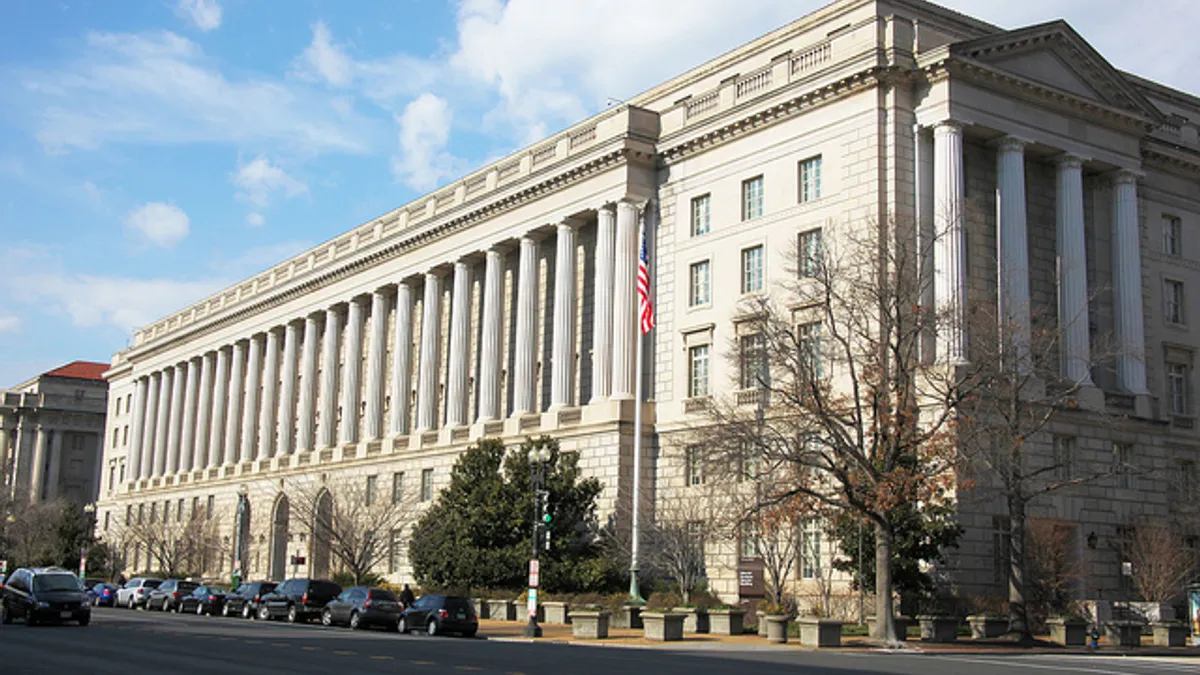Dive Brief:
- Guidance released this week by the Internal Revenue Service could have tax implications for construction companies that plan to ask for forgiveness of their Paycheck Protection Program loans.
- The clarification says that if a business “reasonably believes” its loan will be forgiven, costs related to the loan are not deductible on federal taxes. In the case where a PPP loan was expected to be forgiven but is not, businesses will be able to deduct those expenses, it added.
- The Small Business Association program gave out $525 billion in loans this spring — more than $12 billion of it to U.S. contractors — ranging in size from less than $50,000 to more than $5 million. Loans are forgivable if borrowers devote at least 60% of the proceeds to payroll costs and 40% to certain expenditures like rent and utilities. Even if a business falls short of that threshold, partial forgiveness may be an option.
Dive Insight:
The new guidance is in line with an IRS notice this spring that ruled out tax deductions for wages and rent paid with forgivable PPP loans in order to prevent a “double tax benefit.” The ruling, which means that contractors cannot write off these types of expenses if they were paid for with PPP loan funds, could mean that some firms will get hit with larger-than-usual tax bills.
According to the U.S. Chamber of Commerce, a forgiven PPP loan is tax-exempt but using the loan can reduce how much a construction firm can write off on its business taxes. Usually, expenses like payroll, rent and utilities are deductible from normal taxable income, but without the deduction, a business may owe more taxes than in normal years, the Chamber said.
Joseph Natarelli, leader of the national Construction Industry Practice group at accounting firm Marcum, told Construction Dive that many of his clients are considering not applying for PPP forgiveness in order to avoid a hefty tax bill.
“They’re saying, ‘If I knew then what I know now, then I wouldn't have taken the loan and I would have had to lay people off,’” he said.
The bottom line for contractors, Natarelli said, is to check with their accountants about tax implications before applying for loan forgiveness.
In related news, the SBA mandated this week that borrowers with PPP loans of $2 million or more complete a loan necessity questionnaire regarding their operations and financial conditions during the pandemic. Form 3509 requests information about gross revenues, capital improvement projects, dividend payments and compensation, including whether any employees earn more than $250,000. The completed form is due back to the lender within 10 business days of when the borrower receives it, according to CFO Magazine.
The form has led to pushback from a variety of groups. More than 80 business associations, including several representing the construction industry, sent a letter to congressional leaders Tuesday, saying that the questionnaire “introduces a confusing and burdensome process” for both borrowers and lenders. The coalition also fears it could “lead the agencies to inappropriately question thousands of qualified PPP loans made to struggling small businesses.”
In addition, the form could give the federal government access to "personal, proprietary information that could advantage competitors when it is made public," according to Brian Turmail, AGC vice president of public affairs and strategic initiatives.
Key members of Congress agree and have said they will seek legislation to overturn the IRS’s interpretation.
Among the bills underway is The Small Business Expense Protection Act of 2020, introduced in the Senate in May and backed by Sens. Chuck Grassley, R-Iowa, John Thune, R-S.D., and Ron Wyden, D-Oregon.
Similar legislation is expected to proceed in the House. Rep. Richard Neal, D-Mass., chair of the tax-writing House Ways & Means Committee, is expected to move a bill.
“Providing assistance to small businesses, only to disallow their business deductions … reverses the benefit that Congress specifically granted by exempting PPP loan forgiveness from income,” Neal said in a letter he wrote with his Senate counterparts to Treasury Secretary Steven Mnuchin in May.
Portions of this story originally appeared in sister publication CFO Dive.














